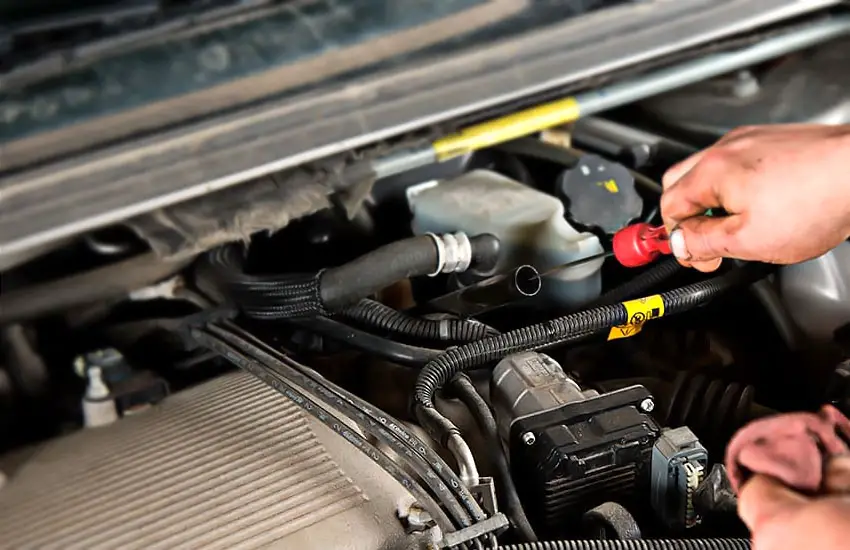As an Amazon Associate, I earn from qualifying purchases at no extra cost to you.
What Does Burning Transmission Fluid Smell Like
When you drive a car, you expect everything to work smoothly. One important part of your vehicle is the transmission, which helps shift gears so your car can move properly. Sometimes, you might notice strange smells coming from your car, especially a burning smell. This smell can mean something is wrong with your transmission fluid. In this blog post, we will explore what burning transmission fluid smells like, why it burns, what causes it to smell, and what you should do if you notice this smell. We will cover everything you need to know to keep your car running well.
Understanding Transmission Fluid
What Is Transmission Fluid?
Transmission fluid is a special liquid used in cars with automatic transmissions. It helps the transmission work by providing lubrication and cooling. This fluid ensures all the moving parts in the transmission can work without grinding against each other. It also helps transfer power from the engine to the wheels.
Types of Transmission Fluid
There are different types of transmission fluids used in vehicles, including:
- Automatic Transmission Fluid (ATF): This is the most common type used in automatic transmissions. It comes in various formulations, depending on the car model and manufacturer.
- Manual Transmission Fluid (MTF): This fluid is used in manual transmissions. It has different properties compared to ATF and is designed for gear lubrication.
- Synthetic Transmission Fluid: This is a more advanced type of fluid that offers better protection and performance. It can withstand higher temperatures and provides better lubrication.
Functions of Transmission Fluid
Transmission fluid serves several essential functions, including:
- Lubrication: It reduces friction between the moving parts of the transmission, which helps prevent wear and tear.
- Cooling: The fluid absorbs heat generated during operation, helping to keep the transmission at a safe temperature.
- Hydraulic Pressure: It helps create hydraulic pressure, which is necessary for shifting gears in automatic transmissions.
- Cleaning: Transmission fluid contains additives that help clean the internal parts of the transmission and keep them free from dirt and debris.
Signs of Bad Transmission Fluid
Bad transmission fluid can cause serious problems for your vehicle. Here are some signs that your transmission fluid may need to be changed:
- Burnt Smell: A strong burning odor often indicates the fluid is overheating and breaking down.
- Dark Color: Healthy transmission fluid is typically bright red or pink. If it turns dark brown or black, it may be time for a change.
- Slipping Gears: If your car struggles to stay in gear or suddenly slips out of gear, it could be due to bad transmission fluid.
- Unusual Noises: Grinding or clunking sounds can indicate that the transmission fluid is not lubricating the parts properly.
- Delayed Shifting: If your car hesitates before shifting gears, it could be a sign of transmission fluid problems.
- Leaking Fluid: If you notice fluid puddles under your car, it could mean there is a leak, which can lead to low fluid levels.
The Importance of Maintaining Transmission Fluid
Regularly checking and changing your transmission fluid is vital for your car’s health. Proper maintenance can help prevent costly repairs down the road. Keeping the fluid clean and at the right level ensures your transmission works smoothly and efficiently.

What Does Burning Transmission Fluid Smell Like?
Characteristics of the Smell
When transmission fluid burns, it produces a distinct smell that is often described as:
- Sweet or Sour Odor: Many people notice that burnt transmission fluid has a sweet or sour scent. This is different from other types of burnt smells, like burnt oil or burnt rubber.
- Chemical Smell: The burning fluid can also have a strong chemical odor, which is not pleasant and can be overwhelming.
- Foul or Acrid: As the fluid continues to burn, the smell can become foul or acrid, making it even more noticeable.
How to Identify the Smell
To identify the smell of burning transmission fluid, pay attention to the following:
- Location: The smell usually comes from the front of the vehicle, near the transmission area.
- Timing: You may notice the smell when you are driving, especially if you have been accelerating or towing something heavy.
- Intensity: The intensity of the smell can vary. Sometimes, it is faint, while other times, it can be very strong.
Differentiating from Other Smells
It is essential to distinguish the smell of burning transmission fluid from other potential smells coming from your car. Here are some tips:
- Burnt Oil Smell: Burnt oil has a more pungent and oily odor compared to burnt transmission fluid, which is sweeter.
- Burning Rubber Smell: If you smell burning rubber, it could be due to a slipping belt or tire issues, not transmission problems.
- Overheated Brakes Smell: The smell of overheated brakes is typically more acrid and sharp compared to burnt transmission fluid.
Why Transmission Fluid Burns
Transmission fluid can burn for several reasons. Understanding these reasons can help you take the necessary steps to fix the issue:
- Overheating: If the transmission overheats, it can cause the fluid to break down and burn. This can happen if the cooling system fails or if the fluid level is low.
- Old Fluid: Transmission fluid has a limited lifespan. If it is not changed regularly, it can become contaminated and lose its effectiveness, leading to burning.
- Low Fluid Levels: If there is not enough transmission fluid in the system, it can cause excessive friction and heat, resulting in burning.
- Contaminated Fluid: Dirt, metal shavings, and other debris can contaminate the fluid, causing it to burn more quickly.
- Poor Maintenance: Neglecting regular maintenance can lead to fluid breakdown and burning.
- Heavy Towing or Load: Towing heavy loads or driving in extreme conditions can cause the transmission to work harder, leading to overheating and burning fluid.
What to Do If You Smell Burning Transmission Fluid
Stop Driving Immediately
If you notice a burning smell coming from your car, the first thing you should do is stop driving. Continuing to drive can cause severe damage to your transmission, leading to expensive repairs.
Check the Fluid Level
Once it is safe to do so, check your transmission fluid level. You can do this by following these steps:
- Park on Level Ground: Make sure your car is on a flat surface to get an accurate reading.
- Warm Up the Engine: Let the engine run for a few minutes to warm up the fluid.
- Locate the Dipstick: Find the transmission dipstick, usually near the back of the engine.
- Remove and Wipe: Pull out the dipstick, wipe it clean, and reinsert it.
- Check Fluid Level: Remove the dipstick again to check the fluid level. It should be between the "full" and "low" marks.
Inspect for Leaks
Look under your car for any signs of fluid leaks. If you see reddish-brown fluid on the ground, it could be transmission fluid. If there is a leak, you need to address it as soon as possible to prevent further damage.
Consult a Mechanic
If you continue to smell burning transmission fluid or find low fluid levels, it is crucial to consult a mechanic. They can diagnose the problem and recommend the best course of action. Ignoring the issue can lead to significant damage and costly repairs.
Change the Fluid
If the transmission fluid is old, burnt, or contaminated, changing it is essential. Here are the steps to change the transmission fluid:
- Gather Tools: You will need a wrench, a drain pan, a funnel, and new transmission fluid.
- Raise the Vehicle: Use a jack to lift the car and secure it with jack stands.
- Remove the Drain Plug: Locate the transmission drain plug and remove it to let the old fluid drain into the pan.
- Replace the Filter: If your vehicle has a transmission filter, replace it according to the manufacturer's recommendations.
- Add New Fluid: Using a funnel, add new transmission fluid through the dipstick tube.
- Check Fluid Level: Start the engine and let it run for a few minutes. Then check the fluid level again, adding more if necessary.
Regular Maintenance
To prevent burning transmission fluid in the future, keep up with regular maintenance. Here are some tips:
- Check Fluid Levels Regularly: Make it a habit to check your transmission fluid level regularly, especially before long trips.
- Change Fluid on Schedule: Follow your vehicle's maintenance schedule for changing the transmission fluid. This can vary based on the make and model of your car.
- Use the Right Fluid: Always use the type of transmission fluid recommended by your car manufacturer. Using the wrong fluid can lead to problems.
- Monitor Driving Conditions: Be mindful of your driving conditions. If you often tow heavy loads or drive in stop-and-go traffic, your transmission may work harder and require more frequent fluid changes.
- Get Inspections: Have your transmission inspected regularly by a professional to catch any potential problems early.
- Listen for Sounds: Pay attention to any unusual sounds when driving. Grinding or whining noises can indicate transmission issues that need immediate attention.
In summary, burning transmission fluid can produce a distinct smell that indicates potential problems with your vehicle’s transmission. It is important to recognize this smell and take action immediately to prevent further damage. Understanding the characteristics of burning transmission fluid, its causes, and the steps to take can help you maintain your car's health. By being proactive and keeping up with regular maintenance, you can ensure your vehicle runs smoothly and efficiently for years to come. If you ever notice a burning smell, don’t hesitate to check the fluid level, inspect for leaks, and consult a mechanic to keep your car in top shape.











